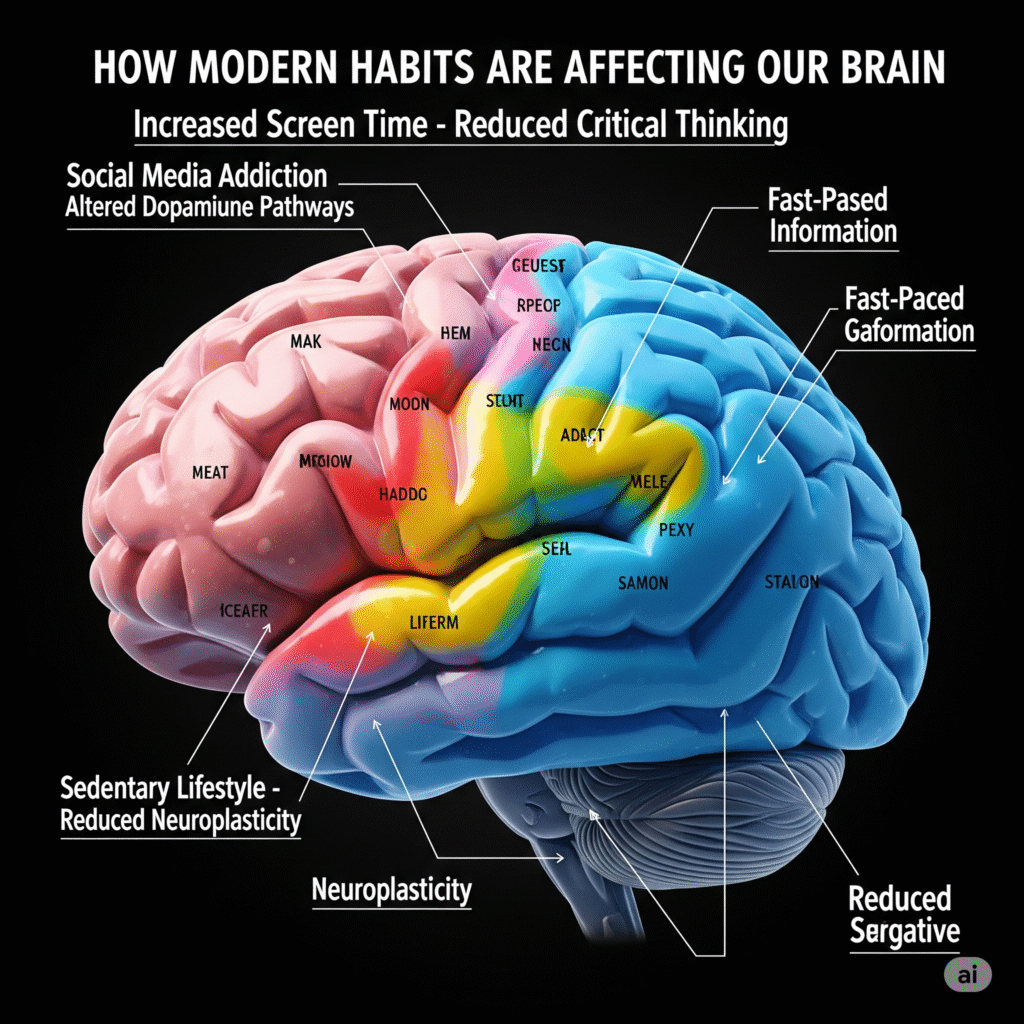In this blog, we try to discuss and show how modern habits are affecting our brain.
Modern habits—like scrolling endlessly on social media, binge-watching YouTube videos, switching tasks every 10 seconds, or checking notifications every few minutes—are rewiring your brain. These habits profoundly affect our brains, leading to subtle and significant changes in structure, function, and chemistry.

Here’s how various modern habits are affecting our brains:
1. Dopamine Overload & Addiction
Digital platforms are designed to trigger dopamine release with likes, comments, and notifications, creating a reward loop. This can condition our brains to seek immediate pleasure, making it harder to delay gratification, tolerate frustration, and engage in more meaningful long-term pursuits.
Every like, comment, or notification gives you a hit of dopamine — the brain’s reward chemical.
But over time, your brain:
-
Gets used to constant stimulation
-
Craves more to feel the same joy
-
Struggles to focus without rewards
This creates a dopamine loop — always searching, never satisfied.
2. Weakened Focus & Attention Span
The constant influx of information, notifications, and readily available entertainment from digital devices conditions our brains to expect rapid, fragmented stimuli. This “popcorn brain” effect makes it harder to sustain focus on single tasks for extended periods. Research suggests the average human attention span has significantly decreased.
Apps like TikTok and Instagram train your brain to:
-
Consume quick, bite-sized content
-
Skip anything slow or deep
-
Expect instant gratification
As a result, your attention span becomes shorter than a goldfish (literally — studies say around 8 seconds now).
3. Decreased Memory & Deep Thinking
The habit of quickly scanning information or seeking immediate answers online can hinder the development of deeper critical thinking skills that require sustained analysis and synthesis of information.
When you rely on Google for every answer or always multitask:
-
You stop storing info in your long-term memory
-
You lose the ability to think critically or creatively
-
Your brain becomes more reactive than reflective
This damages your ability to make deep connections or come up with original thoughts.
4. Higher Anxiety & Mental Fatigue
The constant pressure to stay connected, fear of missing out (FOMO), and the addictive nature of social media can elevate stress hormones like cortisol, leading to increased anxiety, restlessness, and even depression.
Constant digital stimulation keeps your brain in a hyper-alert state. You may feel:
-
Anxious without your phone
-
Mentally exhausted without knowing why
-
Unable to sit still or feel at peace
It’s not just stress — your brain’s nervous system is in overdrive.
5. Loss of Self-Control
The sheer volume of emails, social updates, and online content can overwhelm the brain, leading to stress, decision fatigue, and potentially reducing effective IQ.
Modern habits make you:
-
Avoid discomfort (like boredom or deep work)
-
Chase comfort (like snacks, Netflix, quick pleasure)
-
React emotionally instead of thinking rationally
6. Physical and Physiological Impacts
- Sleep Disruption: Blue light emitted from screens suppresses melatonin production, disrupting natural sleep cycles. Chronic sleep deprivation impairs the brain’s ability to consolidate memories, regulate emotions, and maintain optimal cognitive function, leading to reduced mental clarity, slower reaction times, and increased risk of neurological disorders.
- Sedentary Lifestyle: Prolonged sitting, common in modern life, is linked to thinning in brain regions associated with memory and cognitive decline. Physical activity, on the other hand, increases blood flow to the brain, boosts brain chemicals that promote better memory and learning, and enhances neuroplasticity. Lack of movement also restricts the flow of mood-lifting endorphins.
7. Neuroplasticity
The brain’s ability to adapt (neuroplasticity) is why these changes occur. When we repeatedly engage in certain modern habits, the neural pathways associated with those behaviours strengthen. This means the brain becomes more efficient at these new habits, but potentially less efficient at others.
While some modern habits can be detrimental, the good news is that neuroplasticity also means we can actively shape our brains for the better.
By adopting healthier habits like regular exercise, sufficient sleep, balanced nutrition, mindful digital use, and engaging in mentally challenging activities, we can foster cognitive resilience and promote optimal brain health.
Final Thought
Modern habits are not neutral. They’re shaping the very structure of your brain — changing how you feel, how you think, and even who you are.
Understand the science of “How Modern Habits Are Affecting Our Brain” and learn how to reclaim focus and clarity.
Here’s the good news:
If habits can rewire your brain negatively, they can rewire it positively too.
The key is awareness and intentional habit design.
To understand how these habits are not just reshaping our brains but also our entire way of being, check out my in-depth analysis on how modern habits are changing human nature.
Suggested Outbound References:
Neuroplasticity and Habit Formation
Source: Harvard Medical School – Neuroplasticity
→ Use this link when mentioning: “The brain rewires through repetition”


Thanks for sharing. I read many of your blog posts, cool, your blog is very good.